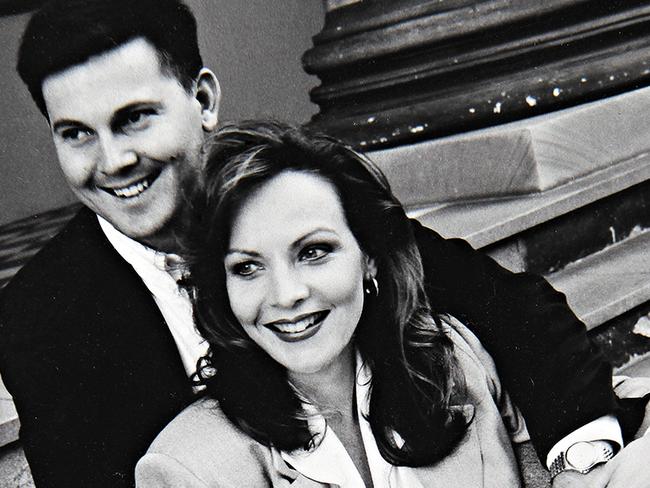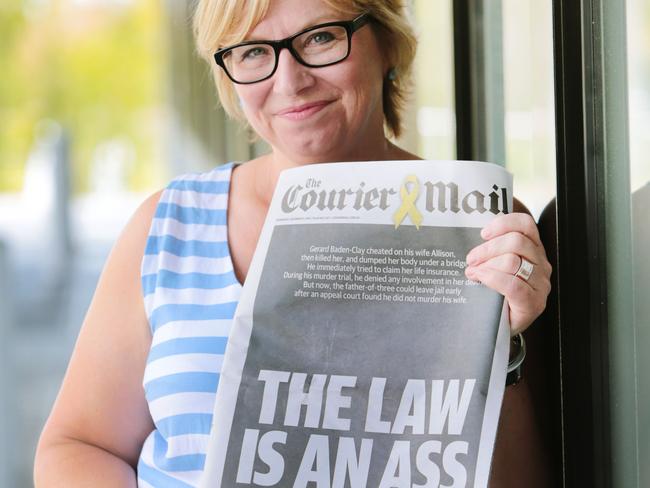Criminal lawyer and civil libertarian calls outrage over Baden-Clay verdict ‘hysterical’
AS THE downgrading of Gerard Baden-Clay’s murder conviction continues to be slammed, this is the uncomfortable truth we don’t want to hear.

OUTRAGE over Gerard Baden-Clay’s manslaughter verdict is “hysteria” fuelled by a trial-by-media, a high-profile criminal defence lawyer has said.
Australian Council for Civil Liberties president Terry O’Gorman also said the Queensland Court of Appeal’s decision to downgrade Baden-Clay’s murder conviction was made “according to the law of the land”.
Baden-Clay was found guilty last year of murdering his wife Allison in 2012 but, in a sensational move that sparked a national outcry on Tuesday, appeal judges set aside the conviction and replaced it with manslaughter, saying it had not been proven beyond reasonable doubt the 45-year-old intended to kill his wife.
Loved ones and supporters of Allison Baden-Clay will hold a mass rally in Brisbane on Friday to call on Queensland’s Attorney-General to appeal the controversial decision.
But Mr O’Gorman told news.com.au the public campaign to pressure the Attorney-General and Queensland’s Director of Public Prosecution was “disturbing”.
“It is disturbing that there is a rally planned for Friday specifically for the purpose of putting pressure on the Attorney-General to appeal to the High Court. The reason why in the 1980s DPPs were set up around the country was to take the politics out of appeal decisions,” said Mr O’Gorman, who is also the vice-president of the Queensland Council for Civil Liberties.
“There is pressure on the DPP to fall into line with this almost manic public reaction to this verdict.
“The reality is that there was no new law in this judgment, the judgment refers to interstate authority, the judgment is the judgment of the court — it wasn’t a split court, the court was unanimous — and, to put it bluntly, the court was comprised of three very experienced appeal judges.

“You do not have a murder case or any other case decided by who can yell out the loudest in the media or otherwise about their disagreement with the verdict. This verdict was handed down according to the law of the land and those who don’t like it have to cop it because that is the law.”
The state is seeking legal advice and has until January 5 to apply to make an application for special leave to appeal the decision in the High Court.
Mr O’Gorman said that it was appropriate for Queensland’s DPP to seek opinion from an interstate silk to “balance the current hysteria” surrounding last week’s decision.
Brisbane’s Courier Mail newspaper, a sister publication of news.com.au, was congratulated for two front pages last week that articulated the widespread public condemnation of the judgment.
The newspaper ran with a front-page headline on Wednesday that read “The law is an ass” — a sentiment echoed by federal Immigration Minister Peter Dutton — and on Thursday penned an open letter to Baden-Clay, calling him a liar, a cheat and a killer”.

“In death, as in life, you continue to dishonour her and disgrace yourself,” it continued.
“Apologise to Allison’s family, show remorse, beg for forgiveness and serve your time in jail.”
Mr O’Gorman was particularly scathing of the Courier Mail’s coverage of Baden-Clay “from day one”, and reiterated his belief that Australia should introduce a US-style mechanism that negates prejudicial pre-trial publicity.
“I don’t think I have seen a case in the 40 years that I have been practising where the main newspaper in Brisbane waged a relentless campaign against Baden-Clay even before he was arrested, waged a relentless campaign in the lead-up to his trial, and continues to wage a relentless campaign,” he said.
“It’s a relentless campaign because (the appeal judgment) simply does not fit their agenda that they have adopted from the time that (Allison) went missing, that Baden-Clay is as guilty as sin.
“It would be almost impossible, and I say it was impossible, to find anyone in Brisbane who did not have an opinion about Baden-Clay by the time the jury was empaneled, and the only person who wouldn’t have had an opinion about Baden-Clay was someone who had been in a coma for 12 months.”
However, the Courier Mail has received praise for its tough stance on the case, with Mr Dutton saying the paper “got it dead right” in slamming the decision and domestic violence campaigner Rosie Battie posing for a photograph with the front page.

Queensland Law Society president elect Bill Potts, himself a practising criminal lawyer, said while he believed the appeal judges’ decision to downgrade Baden-Clay’s conviction was right he welcomed robust public discussion over the decision.
“The wonderful thing about law is that we can disagree about fundamental things,” he told news.com.au.
“[Friday’s public rally] is to urge the acting Attorney General to lodge an appeal and also to draw attention to the plight of victims of domestic violence, and those are very good things. The public own the justice system and a responsive prosecution and political system will no doubt listen to and respond to the public outcry.

“However, independent objective thought has to decide justice, no matter how reprehensible or heinous Mr Baden-Clay may in fact be. It’s one of the great strengths of our Australian liberal democracy.
“The court’s duty rises above this outcry. Their duty is to simply look at all the facts and all the law and apply it.
“The decisions of the courts are not always popular. If the court of appeal has it wrong, which I strongly doubt, it will be up to the High Court to decide whether they will grant special leave to appeal.
“Judges in Queensland are always going to attract differences of public opinion and that’s a good thing, but the obligation upon them is not to be enslaved by public opinion but rather decide, firstly accounting to law, and also apply the standards of the community in which they are part.”
Mr Potts said even though Baden-Clay was found to have lied to police, the media and, under oath, to the court — most famously about the cause of scratch-like marks on his face — it did not take away from the fact the prosecution had to prove every element of the offence of murder.
That included, he said, intent to kill.
Last week’s judgment found there was insufficient evidence to prove Baden-Clay’s murderous intent.
The judgment noted that while it was not the Crown’s obligation to establish a motive, “to do so might have assisted in proving an intent to kill or do grievous bodily harm”.
“The evidence of financial stress and the extramarital affair suggested a context of strain between the couple which might well have culminated in a confrontation; but it did not provide a motive or point to murder rather than manslaughter,” it continued.
Mr Potts said: “It’s not a matter of whether Mr Baden-Clay deserved the benefit of the doubt. It’s his absolute right, and that principle applies to every person whether they’re charged with speeding all the way through to murder.”




